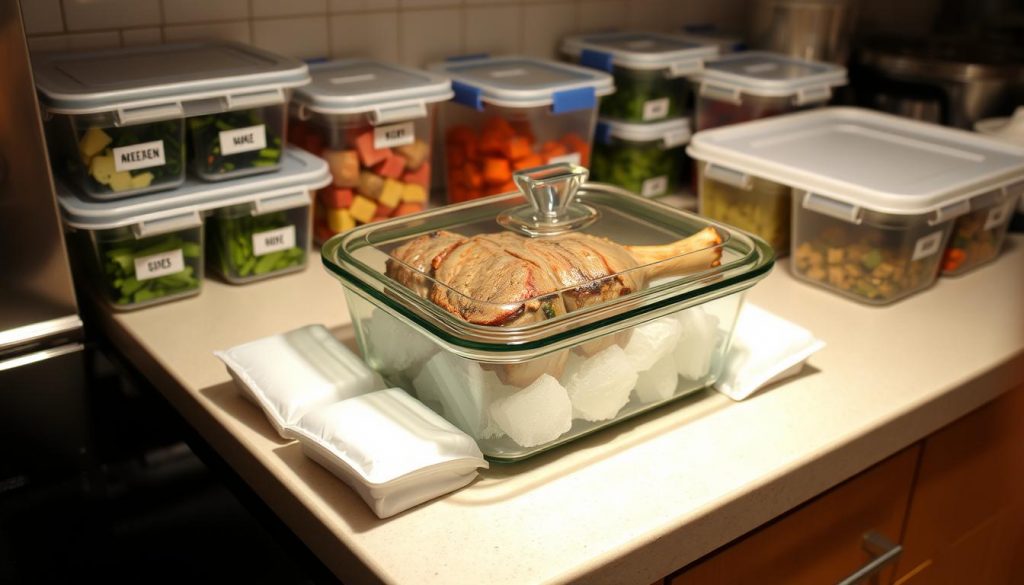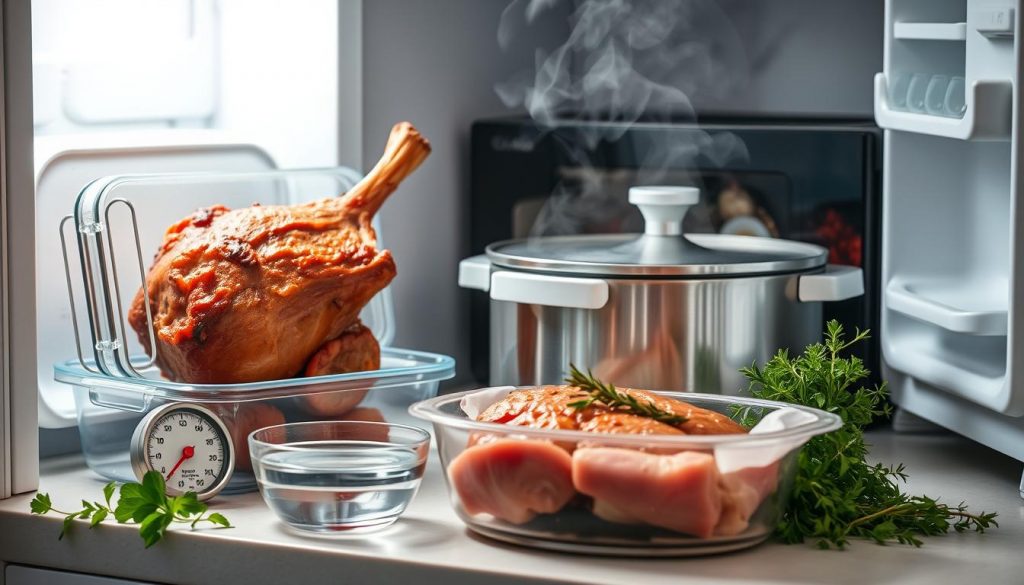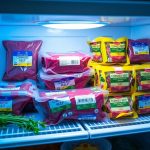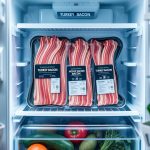We all love a delicious lamb dinner, but what about the leftovers? It’s important to know about food safety and how to store lamb. Let’s explore refrigeration and leftovers to find out: how long does cooked lamb last in the fridge?
Cooked lamb can safely stay in the fridge for 3 to 4 days at 40°F or below. This time lets you enjoy your leftovers while keeping them safe. Remember, refrigeration slows down bacteria growth but doesn’t stop it. Freezing is the best option for longer storage.
Key Takeaways
- Cooked lamb lasts 3-4 days in the fridge at 40°F or below
- Proper storage is essential for food safety and quality
- Freezing extends storage time up to 2-3 months
- Refrigeration slows bacterial growth but doesn’t halt it
- Never leave cooked lamb at room temperature for over 2 hours
Understanding Proper Lamb Storage Basics
Storing cooked lamb right is key for food safety. We’ll look at the main points of proper storage. This will help keep your lamb fresh and safe to eat.
Importance of Temperature Control
Keeping your fridge at 40°F (4°C) or below is important. The coldest part, around 35.6°F (2°C), is best for meat. This keeps cooked lamb fresh for 3-4 days.
Safe Storage Containers
Use airtight containers for cooked lamb. They stop air from getting in and keep meat fresh. If you don’t have containers, wrap the lamb in heavy-duty aluminum foil or plastic wrap. This keeps quality high and stops bacteria spread.
Cross-contamination Prevention
Keep cooked lamb away from raw meats and other foods to avoid cross-contamination. Store raw lamb in plastic bags to stop juices from leaking. Always wash your hands before and after handling lamb to keep food safe.
| Storage Method | Temperature | Duration |
|---|---|---|
| Refrigerator (Cooked) | 40°F (4°C) or below | 3-4 days |
| Freezer (Cooked) | 0°F (-18°C) or below | 2-6 months |
| Refrigerator (Raw) | 40°F (4°C) or below | 3-5 days |
How Long Does Cooked Lamb Last in the Fridge
Understanding the shelf life of lamb is key. Cooked lamb can stay in the fridge for up to three days. This ensures your lamb dishes are fresh and safe to eat.
For those who enjoy meal prep or have leftovers, here’s a quick guide:
- Refrigerator storage: 3 days
- Freezer storage: Up to 2 months
These times are for the best taste and quality. Frozen lamb can last a year, but its taste and texture may change. Once thawed, don’t refreeze it.
Raw lamb has different storage rules. It can stay in the fridge for up to two weeks, making it more tender. But, long storage can cause color changes and more microbes.
“Always prioritize food safety. When in doubt, it’s better to discard lamb that you suspect might have gone bad.”
By sticking to these guidelines, our lamb dishes stay safe and tasty. Always check if your stored lamb is good to eat using your senses and judgment.
Signs of Spoiled Cooked Lamb
It’s important to know when lamb has gone bad. This is key for keeping lamb quality and food safety high. We’ll show you how to spot spoiled cooked lamb.
Visual Indicators
Watch for color changes in your cooked lamb. It should be pinkish-brown. If it’s greenish or grayish, it’s spoiled. Also, mold, which looks like fuzzy spots, is a clear sign.
Smell and Texture Changes
Your nose is great at spotting spoiled lamb. Fresh lamb smells mild and meaty. If it smells sour or rotten, it’s bad. The texture should be firm but tender. If it’s slimy or sticky, it’s spoiled.
When to Discard
Throw away cooked lamb after 3-4 days in the fridge, even if it looks and smells good. Bacteria can grow without signs. Trust your gut – if it doesn’t feel right, throw it out. Good food safety habits prevent sickness.
“If in doubt, throw it out. Your health is worth more than a few bites of questionable lamb.”
By being careful and following these tips, we can keep our lamb dishes safe and tasty. Let’s make food safety a priority in our kitchens!
Proper Cooling and Storage Techniques
Learning how to cool and store cooked lamb is vital for food safety. We’ll show you the best ways to keep your leftovers fresh and safe.

Cool your cooked lamb at room temperature for no more than 90 minutes. This quick cooling stops bacteria from growing. Then, put the lamb in shallow airtight containers. These containers cool faster in the fridge and keep the lamb fresh.
Put the containers on the bottom shelf of your fridge. This stops drips from getting to other foods. Also, keep your fridge at 41°F (5°C) or below to slow down pathogen growth.
Write the storage date on each container. This makes it easy to remember when to eat the lamb, within 3-4 days. If you can’t eat it in time, freeze it for longer storage.
| Storage Method | Maximum Storage Time | Temperature |
|---|---|---|
| Refrigeration | 3-4 days | 41°F (5°C) or below |
| Freezing | 4-6 months | 0°F (-18°C) or below |
By cooling and storing your cooked lamb correctly, it will stay fresh and safe to eat for days.
Freezing Cooked Lamb for Extended Storage
Freezing lamb is a great way to keep it fresh for a long time. We’ll show you how to freeze cooked lamb so it stays tasty for months.
Freezer Storage Times
Cooked lamb can be frozen for up to 3 months. This means you can enjoy your favorite lamb dishes even after they’re made.
Best Packaging Methods
To avoid freezer burn, use airtight packaging. Aluminum foil, freezer paper, or bags are good choices. Vacuum sealing is even better. It removes air and stops ice crystals from forming, keeping the lamb’s taste and texture.
Labeling and Organization
Labeling is important for keeping food fresh. Write what’s inside and when you froze it on each package. Keep your freezer organized by putting newer items in the back. This way, you use the oldest items first, saving food.
| Storage Method | Duration | Temperature |
|---|---|---|
| Refrigeration | 3-4 days | 40°F (4°C) or below |
| Freezing | Up to 3 months | 0°F (-18°C) |
By freezing lamb the right way, you keep it safe and tasty for longer. Remember, good food preservation methods lower the chance of getting sick from food. Foodborne illnesses affect 1 in 6 Americans every year.
Thawing and Reheating Safety Guidelines
Food safety is key, and thawing and reheating lamb correctly is essential. We’ll show you how to keep your leftover lamb safe and tasty.

- Refrigerator thawing (slow but safest)
- Cold water thawing (faster, requires attention)
- Microwave thawing (quickest, use immediately)
Never thaw lamb at room temperature. It’s too warm for safety. Use thawed lamb within 5 days.
Here’s how to reheat lamb safely:
- Heat to an internal temperature of 165°F
- Use a food thermometer to check
- Reheat only once
- Discard any leftovers after reheating
Proper reheating kills harmful bacteria. This step is key to avoiding foodborne illnesses.
| Food Type | Safe Internal Temperature |
|---|---|
| Lamb steaks and roasts | 145°F |
| Ground lamb | 160°F |
| Reheated lamb | 165°F |
By following these guidelines, we can enjoy our leftover lamb safely. This reduces the risk of food poisoning.
Best Practices for Leftover Lamb Dishes
We love making the most of our leftover lamb. Smart food storage and meal prep help us enjoy tasty dishes without wasting food. Let’s look at some key strategies for leftover management to keep your lamb fresh and delicious.
Storage Container Selection
Choosing the right containers is key for food storage. We use airtight, microwave-safe options. These keep our lamb fresh and make reheating easy. Glass containers are perfect because they don’t absorb odors and are easy to clean.
Portioning for Later Use
Smart meal prep begins with portioning. We divide our leftover lamb into single servings. This makes quick meals easy without thawing too much at once. It saves time and reduces food waste.
| Storage Method | Duration |
|---|---|
| Refrigerator | 3-4 days |
| Freezer | Up to 2 months |
Temperature Management
Keeping the right temperature is vital for food safety. We keep our fridge at or below 40°F. Using an appliance thermometer helps us keep this safe temperature. Remember, cooked lamb shouldn’t be left out for more than 2 hours.
“Leftover lamb is a versatile ingredient. With proper storage, it can be transformed into delicious new dishes, from shepherd’s pie to lamb curry.”
By following these practices, we ensure our leftover lamb stays fresh for our next meal. It’s all about smart food storage, efficient meal prep, and careful leftover management.
Food Safety Tips for Handling Cooked Lamb
Food handling and kitchen hygiene are very important. Let’s look at some key tips for safely handling cooked lamb. Always wash your hands well before and after touching the meat. This simple step helps prevent cross-contamination.
In the kitchen, use separate cutting boards and utensils for raw and cooked meats. Clean all surfaces with hot, soapy water and sanitize with a bleach solution. When serving leftover lamb, use clean utensils and plates. These steps keep your kitchen clean and reduce the risk of foodborne illnesses.
Proper storage is key to keeping your cooked lamb fresh. Food safety guidelines say to refrigerate cooked lamb within two hours of cooking. It should be eaten within three to four days. If you won’t eat it in time, freeze it. Wrap the lamb tightly in heavy foil or freezer wrap, or use a freezer container. Frozen cooked lamb can stay good for up to three months if stored right.
Food safety is up to you. By following these tips, we can enjoy our meals safely. Stay safe and bon appétit!




